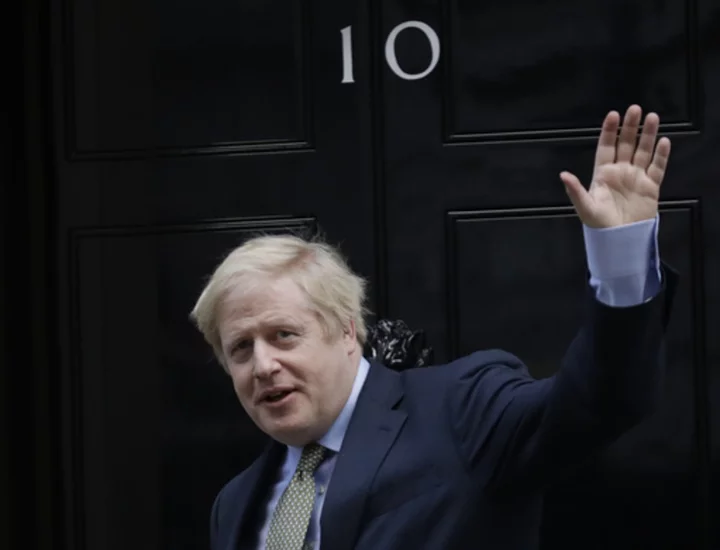
USMNT rumors: Wright to Fenerbahce, Robinson to PSV, Dempsey on MLS
Today's USMNT rumors include Haji Wright being linked with Fenerbahce. Miles Robinson could be on his way to PSV Eindhoven and Clint Dempsey has spoken on American players returning to MLS.
2023-10-28 01:50

Was Mitchel Musso drunk during arrest? 'Hannah Montana' star speaks out after Texas incident
According to Rockwall County jail records, Mitchel Musso was taken into custody on Saturday evening, August 26
2023-08-31 16:54

NBA Awards Rankings: New No. 1 in Sixth Man of the Year race
We are past the one-month mark of the 2023-24 NBA season. Here's an updated look at a crowded Sixth Man of the Year race.
2023-12-03 03:28

Exchange Bank Announces AJ Vazquez, Vice President, Branch Manager
SANTA ROSA, Calif.--(BUSINESS WIRE)--Oct 26, 2023--
2023-10-26 23:22

French IT group Atos shares soar as Onepoint buys almost 10% stake
Shares in IT services and consulting company Atos spiked by more than 16% on Thursday after Onepoint said
2023-11-02 17:51

Who is Jazmin Paez? Miami mom, 18, arrested after offering money on fake hitman website to kill 3-year-old son
Investigators claimed that the man behind the parody murder-for-hire website gave them the heads-up about Jazmin Paez's evil plan
2023-07-20 20:16

Exclusive-AI chip startup d-Matrix raises $110 million with backing from Microsoft
By Max A. Cherney Silicon Valley-based artificial intelligence chip startup d-Matrix has raised $110 million from investors that
2023-09-06 18:24

Search for suspect underway after shooting leaves 2 Orlando officers in critical condition
Two Florida officers are in critical condition Saturday after a shooting Friday night, Orlando Chief Police Chief Eric D. Smith said in a news conference.
2023-08-05 21:18

Manchester United hit Mason Mount obstacle as Chelsea name price
Chelsea are insistent on receiving at least £55m for Mason Mount this summer, with Manchester United yet to match the club’s valuation for the England international despite leading the race for his signature. The 24-year-old is willing to go to United amid interest from Liverpool and Arsenal and agreement on a price is now the only obstacle to his move to Old Trafford. Mount only has a year left on his contract and has refused to sign a new deal amid uncertainty at Chelsea. The midfielder believes United’s system under Erik ten Hag offers the best fit, with the Dutchman understood to have the clearest idea for him. United do not want to go as high as £55m because their own summer budget is open to change with the takeover, but it is felt a deal will eventually be done despite the clubs currently being some way off agreement. United thrashed Chelsea on Thursday night to secure Champions League qualification which drastically improved what they can offer Mount next season. Ahead of the meeting at Old Trafford, United boss Ten Hag rather pointedly noted that spending big sums without having a cohesive plan in place to utilise those signings effectively was a total waste - as Chelsea have found out this season. “When there is no strategy behind, or (not) the right strategy, money doesn’t work,” he said. “In this moment there is a centralisation of good players, of the best managers, also of the money, it is all here in the UK. And that makes a great competition, but also a tough and a hard competition. “And you have to do the right things and you can have money but you have to do it and spend it in a smart way and also you need a strategy behind it, because, otherwise, the money doesn’t work.” Read More £600m spent but still outscored by Haaland – Chelsea’s masterpiece of stupidity Manchester United owe Champions League return to one man Man Utd to learn extent of Antony injury which will see him miss FA Cup final
2023-05-26 23:53

MLB rumors: Boston Red Sox roster moves, Colorado Rockies trade chips, Chicago White Sox at top of list
As the weekend approaches, let's take a look at some of the latest MLB rumors, including tidbits on the Boston Red Sox, Colorado Rockies and Chicago White Sox.MLB rumors: Boston Red Sox prepping for tough roster decisions?With Pablo Reyes (abdominal strain) and Yu Chang (left hamate) expect...
2023-07-08 05:24

Kaiser Permanente and healthcare workers head for labor clash as strike deadline looms
By Ahmed Aboulenein WASHINGTON Kaiser Permanente appeared headed for a labor clash with 75,000 of its healthcare workers
2023-10-04 09:23

Boris Johnson's bombshell exit from Parliament leaves UK politics reeling
Former U_K_ Prime Minister Boris Johnson has left chaos in his wake after quitting Parliament and accusing fellow lawmakers of ousting him in a “witch hunt.”
2023-06-10 18:48
You Might Like...

'The Witcher' Season 3: Henry Cavill was picked to play Geralt after being rejected by makers many times

Slick Spain crush Swiss as Norway face Japan World Cup test

Mick Jagger, father of eight, explains why parenting is ‘not like riding a bike’

The Buff Stops Here: Best memes and tweets from Oregon blowing out Colorado

Argentina Heads to Runoff With Massa Surprisingly Leading Vote

Wisconsin GOP leader silent on impeachment of Supreme Court justice after earlier floating it

NBA Draft Rumors: Damian Lillard ripple effect, Hornets indecision, Pacers trade

Brazil's finance minister expects interest to fall to 'at least' 12% by year-end
